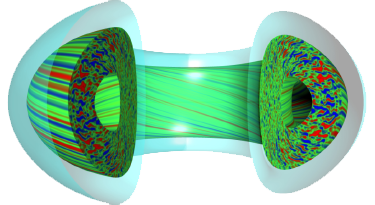Speaker
Description
UTILISING CLOUD RESOURCES TO PERFORM MONTE-CARLO BASED UNCERTAINTY QUANTIFICATION OF FUSION SIMULATIONS
Stanislas Pamela
UKAEA
Abingdon, UK
Email: Stanislas.Pamela@UKAEA.uk
James Buchanan
UKAEA
Abingdon, UK
Email: James.Buchanan@UKAEA.uk
Andrew Lahiff
UKAEA
Abingdon, UK
Email. Andrew.Lahiff@UKAEA.uk
Abstract
The increased availability of academic and affordable public cloud compute resources provides an opportunity for cheap and easy deployment of large ensembles of simulations onto remote clusters, subject to the caveat that the simulations do not require specific HPC infrastructures. An obvious target use case of such an ensemble is for the propagation of aleatory uncertainties through simulation codes. By sampling from known distributions of uncertain input parameters one can build distributions of outputs of interest, thus providing quantification of the output uncertainty. The ability to quantify the uncertainties on key parameters output from simulations will be a vital ingredient both in optimising plasma scenarios and in de-risking the design of future reactors. UKAEA has developed a framework, VVeb.UQ, which enables the deployment of ensembles of containerised user codes onto cloud resources for performing Monte-Carlo based uncertainty quantification. The framework is built on top of Docker and can exploit either the DAKOTA framework [1] or the VECMA toolkit [2] for parameter sampling. It uses PROMINENCE [3] to handle deployment opportunistically across all available resources. The framework can be interacted with via a simple web interface or a command line REST API.
Some preliminary studies have been undertaken using the framework to look at uncertainties around fusion relevant codes. Equilibrium reconstruction is a foundational component of many fusion workflows, so an attempt has been made to quantify the uncertainties on equilibria reconstructed using the EFIT++ equilibrium code [4] due to uncertainties on input magnetics and MSE data on MAST. In addition to this, work has been conducted using the JOREK non-linear MHD code [5] regarding the prediction of large-scale plasma instabilities.
Future work will focus on expanding the number of codes coupled to framework as well as on the development of more dynamic workflows where outputs are recovered, and further runs are submitted automatically based on the results. This would enable the training of surrogate models, including the use of sequential design schemes, and the use of optimisation tools built into frameworks like DAKOTA.
References
[1]. https://dakota.sandia.gov/
[2]. https://www.vecma.eu/
[3]. https://doi.org/10.1051/epjconf/202024507032
[4]. L.Appel et al. Computer Physics Communications 223, 1-17, 2018.
[5]. https://jorek.eu
| Country or International Organisation | United Kingdom |
|---|---|
| Affiliation | UKAEA |

